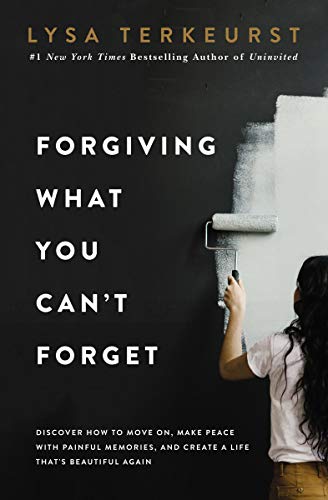Lysa TerKeurst Teaches How to Forgive What You Can't Forget
Her Own Story
Lysa is very forthcoming about her struggle to deal with her husband, Art’s, past marital infidelity, and the journey of healing they remain on today. She recalls thinking in the beginning, “My strong but normally carefree spirit became a confusing mix of anxiety, panic attacks, and soul-blinding pain so intense I thought I’d never feel healthy or regain a sense of normalcy again.” At the start, she and Art separated, worked with counselors on their own, and after much time, prayer, and thought, renewed their vows and reunited. Still, Lysa is very realistic in stating that healing is a journey, trust takes a long time to rebuild, and that there are still memories that trigger pain.
What Forgiveness Is And Isn't
As Lysa has explored what forgiveness means in her own life, with the help of an able counselor, she says the process applies to us all, no matter what offense one has suffered. She’s found that there’s great misunderstanding, even amongst believers, as to what forgiveness actually means. “It is not an unfair gift to the offender,” she says, “but a process through which God provides a way for the offended to heal.” While forgiveness is commanded by Scripture, she points out that reconciliation is not.
Forgiving doesn’t mean that trust has been rebuilt, or that healthy boundaries aren’t needed. Lysa points to the difference between reunion, where two people are both willing to do the hard work of restoring the relationship, and redemption, which is between each person and God. In redemption, she says, we give up our right to demand that the one who hurt us pay us back or suffer, and leave that with God. What we gain is the freedom to move on, whether or not the relationship is restored.
Lysa also says that forgiveness is not something we can muster up on our own through self-determination, but only by yielding to God. “My ability to forgive others rises and falls, instead, on this: leaning into what Jesus has already done, which allows His grace for me to flow freely through me (Ephesians 4:7)...Forgiveness is only made possible by my cooperation.”
How Do We Forgive?
Early in the healing process, Lysa’s counselor asked if she were ready to forgive. “You’re crazy, I’m still hurting!” she said without hesitation. He helped her see that choosing to forgive is taking power away from the people who hurt us, and that they are not capable of being our healers or restorers. “Forgiveness is both a decision and process,” Lysa states. “I only needed to bring my willingness to forgive, not the fullness of all my restored feelings. The decision to forgive doesn’t fix all the damaged emotions. It doesn’t automatically remove the anger, frustration, doubt, damaged trust, or fear.” To give form to her decision to forgive, Lysa was encouraged to write out each offense she felt from any person on a 3x5 card, and declare her forgiveness for the person and specific hurt. She ended each with the prayer: “And what my feelings won’t yet allow, the blood of Jesus will more than cover.”
After making the decision to forgive, Lysa says we have to go through the process of forgiving in order to move on and make peace with painful memories. The process could take weeks, months, or years depending on how extensively one has been hurt. Lysa says the process is about learning how to deal with the deeply wounded emotions and consequences of others’ actions. One of the ways she did so was to give herself permission to express all that she was feeling--to God, friends, her counselor, her journal. When she felt tempted to give up or give in to cynicism or bitterness, she challenged herself with these reminders:
- I don’t need to run away.
- I don’t need to isolate.
- I don’t need to numb it away.
- I don’t need to silence my journaled words.
- There is a healed version of me that is waiting and wanting to emerge.
Another skill that Lysa has learned in the process of forgiving was setting healthy boundaries. “It’s for the sake of your sanity that you draw necessary boundaries,” she says. “It’s for the sake of stability that you stay consistent with those boundaries.” As we grow and heal, those boundaries can change, she adds. Some of the helpful ones she employed are:
- I can mute (or unfollow) someone’s social media account that triggers unhealthy reactions when I see them.
- I will not sweep lies under the rug or help another person cover up their bad behaviors.
- I can say no.
- I can be honest about what I can and cannot give.
- I can choose not to engage in conversations that encourage the emotional spiral.







